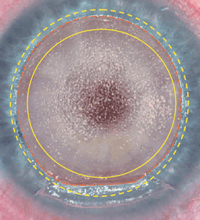 |
|
The emotional well-being five-item scale developed in this study may help identify the small—but important—group of patients who are unsatisfied with their post-refractive surgery outcome. Photo: Martin L. Fox, MD. Click image to enlarge. |
Satisfaction with treatment outcomes is one of the most important measures of success in refractive surgery. One way to evaluate which factors play a role in patient-reported outcomes is through the use of patient questionnaires. Information from these surveys can help to identify healthcare interventions that are effective and those that may need more attention.
Many patient-reported outcome measures used today require old-fashioned pen and paper, making it more difficult to detect patterns and draw conclusions from the data. In search of a more contemporary solution, a group of researchers developed a short electronic patient-reported outcome measure for post-refractive surgery called the Vision Correction Questionnaire. They suggest it may be useful in routine clinical care or in clinical trials and eventually be able to integrate with data registries and EHRs.
The researchers leading the questionnaire development study created a survey distributed to 360 refractive surgery patients postoperatively including items in the following six domains: spectacle dependence, visual quality, eye comfort, functional freedom, emotional well-being and treatment satisfaction. A second cohort of patients (n=120) received a modified version of the survey (excluding spectacle dependence and treatment satisfaction domains) that was distributed both pre- and post-op to assess sensitivity to change.
The only domain found to produce an effect was emotional well-being. The research team noted in their study, published in the Journal of Cataract & Refractive Surgery, that the emotional well-being scale was sensitive to change and that scores were higher after treatment, “suggesting a positive impact on emotional well-being.”
On the other hand, the researchers didn’t obtain a good fit for the other three domains relevant to refractive surgery: visual quality, eye comfort and functional freedom.
“At discharge, over 98% of our patients were satisfied (16%) or very satisfied (82%) with their treatment, and over 95% responded in the top two categories for all items,” they explained in their paper. “This implies a highly significant mismatch between item difficulty and respondent ability—most refractive surgery patients have very few problems.”
Nevertheless, the emotional well-being five-item scale developed in this study may act as a psychometrically robust measure and help to identify the small—but important—group of patients who are unsatisfied with their post-refractive surgery outcome. Knowing this information can enable you to find ways to intervene and help the patient feel and see better as best you can.
The question asked in the emotional well-being component of the screener was as follows:
Over the last month, how often have you felt...
... able to do the things you want to do?
... eager to try new things?
... excited about the future?
... free from health worries?
... secure?
Patients were asked to choose from one of the following four replies for each:
Most of the time
Some of the time
Occasionally
Never
Frings A, Ziaei M, Lundström M, Allan BD. The Vision Correction Questionnaire (VCQ): an electronic patient-reported outcome measure for refractive surgery. J Cataract Refract Surg. July 20, 2022. [Epub ahead of print]. |


